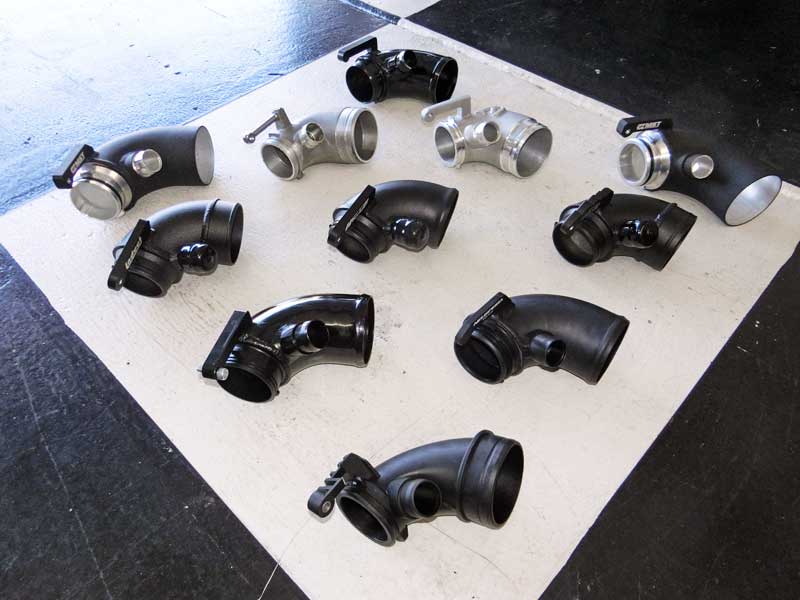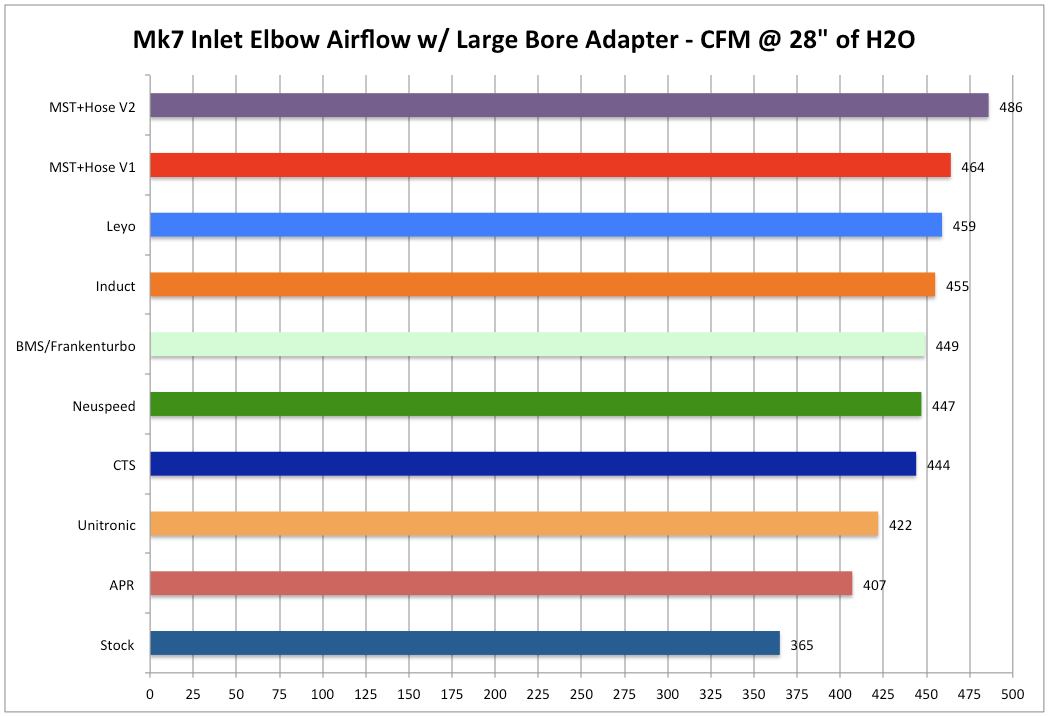Continuing to investigate different intake configurations some more flow testing is being performed focusing on Mk7 turbo inlet elbows. For this latest test a larger diameter adapter is being used to connect the inlet elbow to the flow bench.
Setup:
In recent inlet elbow flow tests an adapter that is sized to replicate an IS20 or IS38 compressor housing inlet has been used. For this series of tests a silicone connector hose with an inside diameter of approximately 56 mm is to be used to attach the inlet elbow to the flow bench.
The reason for using the larger size adapter is that it is possible an aftermarket turbocharger may use a large compressor inlet than the stock turbochargers. This test is being performed to gain some insight into potential gains from using a larger adapter with an appropriately sized compressor housing inlet.
The Parts:
The collection of inlet elbows has grown slightly:

Since the last “group” test Unitronic provided their inlet elbow, MST-Performance supplied a revised version of their inlet elbow, and Frankenturbo sent in a product.
Note: The Frankenturbo inlet was flow tested prior to this group test using the stock size adapter. Airflow measured 395 CFM which is 1 CFM higher than the Burger Motorsport elbow. Looking the two products over they are indistinguishable; from which I conclude both vendors probably have the same supplier. The products are listed together in the results because any difference in airflow is most likely a product of test margin of error.
The Test:
Similar to the previous testing the flow bench is first calibrated and then the inlet elbows are assembled along with the adapter and the stock accordion hose as well as the top half of the stock airbox.

Note: The picture above is of a variation test performed where the stock accordion hose was replaced with the APR carbon fiber inlet hose. For the test results below the stock accordion hose was used.
The Results:
Airflow measurements with the larger adapter are shown in the chart below:

Conclusions:
The across the board gains in airflow when compared with the stock size adapter are as expected.
In terms of comparison ranking there are a few changes that are likely a result of design attributes beyond inlet and outlet cross section. For the most part the middle grouping of products is the same and the variation between airflow measurements is minimal. The average of the middle pack is 451 CFM +/- 7 to 8 CFM.
An unusual finding occurred during the Unitronic elbow testing. The airflow measurement was outside of the norm sufficiently to lead to an investigation of the test setup and if something had been put together ‘wrong’. The parts were disassembled and then reassembled and after rechecking the bench calibration the Unitronic elbow was flow tested again. A difference of 10 CFM from the first test was observed during the re-test. This led to varying the alignment of the Unitronic elbow with the stock accordion hose. (See the arrows in the picture below.)

What was discovered was that a few degrees of misalignment between the accordion hose and inlet elbow could produce a change in airflow of approximately 10 CFM, approximately 2.5% of the total airflow.
The implication of this finding can be viewed in relation to all of these tests as well as for a part in use on the vehicle.
For the test procedure none of the aftermarket inlet elbows have alignment markers on them for where to align the elbow with the accordion hose as the stock parts have. It is possible that slightly changing the alignment of the elbow with the accordion could change the airflow results a small amount. Short of retesting all of the elbows and trying to find the optimal alignment between the elbow and accordion hose there is some potential for variation in the rankings.
This finding also extends to use on the vehicle where the air supply to the turbocharger can also be affected by a misalignment between parts. It is likely that at the lower flow rates seen with the stock compressor housing that the impact would be even more minimal.
Gains measured with the larger adapter ranged from only 1% using the stock inlet elbow up to 19% with the MST-Performance revised inlet elbow. This latest MST elbow has a slightly larger outlet than the first version that MST provided. Interestingly the larger outlet version two showed no difference from the first version when coupled with the stock size adapter, but with the larger adapter it gained 22 CFM over their first version.

The chart above shows the gains that each turbocharger inlet elbow produced when going from the stock size adapter to the larger, 56mm ID adapter.

